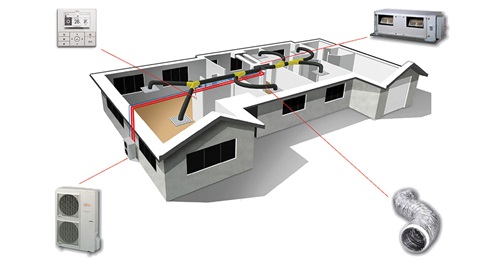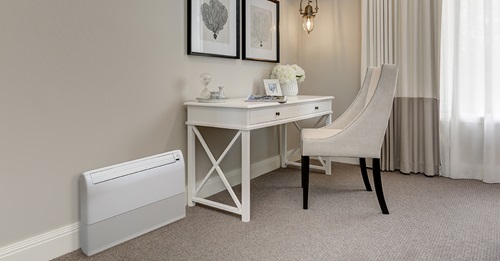Do Air Conditioners Dehumidify?

The simple answer is yes, air conditioners dehumidify, but it's a byproduct of the cooling function rather than a separate function. With Fujitsu air conditioners, there isn’t a standalone ‘dehumidify’ option. The most effective way to reduce humidity is by using dry mode, which lowers moisture while maintaining energy efficiency.
Let's look in greater detail at how a dehumidifier works on an air conditioner, how they differ from standalone dehumidifiers and whether all air conditioners are able to reduce the amount of moisture in the air.
How Air Conditioners Dehumidify
Residential air conditioners are capable of removing humidity as a normal process in the cooling loop. Indoor warm air is exposed to the cold evaporator coils, and the water condenses on the surface. The water drains away, and drier air remains to recirculate back into your room. This natural process is how an air conditioner dehumidifies the indoor air. While air conditioners do dehumidify, they’re not as effective at doing so as a dedicated dehumidifier, especially in places with regular high humidity. If you live in an area that's damp or coastal, setting your unit to ‘dry mode’ will be effective. However, it won’t pull as much moisture out of the air as a standalone dehumidifier designed for that purpose.
Here’s how Dry Mode works:
The heat pump’s fan and compressor run at a slower, on-and-off cycle.
Instead of full cooling, the system gently moves warm, humid air across the cold coil.
As the air cools slightly, moisture condenses on the coil and drains away.
This lowers the humidity in the room without dropping the temperature too much.
The result is an efficient way to stay comfortable in damp conditions.
Dehumidifier vs Air Conditioner
Both units can cut down moisture, but in different ways. Air conditioners remove humidity only as a by-product of cooling the air. An air conditioner will first cool the air, resulting in dehumidification. A dehumidifier, on the other hand, is designed to extract moisture, but it won't lower the room's temperature.
Feature / Purpose | Reverse Cycle Air Conditioner | Dehumidifier |
Primary function | Heating and cooling | Removing moisture from the air |
Dehumidifying ability | Happens naturally during cooling (secondary effect) | Dedicated and continuous |
Year-round comfort | Controls both temperature and humidity | Only tackles humidity |
Best for | Every day use across all seasons in most Australian homes | Damp areas like laundries or winter condensation |
Limitations | Won’t dehumidify in heating mode; may not run in cooling mode often enough in winter | Does not heat or cool the air |
Ideal choice | Residential air conditioners for comfort, efficiency and healthy air | Useful for persistently damp spaces |
You may find it's worth the money to get a dehumidifier if:
You live in a very humid or coastal area with perpetual moisture in the air, even with your air conditioner running.
You notice condensation on windows or musty smells that aren’t resolved by cooling alone.
You want to reduce mould growth or have allergy symptoms related to high humidity.
You are drying clothes indoors.
Do All Air Conditioners Dehumidify?
Yes, all air conditioners remove some moisture as part of the cooling process. Both split system air conditioners and ducted air conditioning systems are especially effective, as they move larger volumes of air over the coils.
Portable or window units also reduce humidity, but usually not as efficiently. If humidity is an ongoing issue, using dry mode or pairing your AC with a dehumidifier can help maintain balance in both comfort and air quality.
Purpose of Dehumidification in Air Conditioners
Did you know that dehumidifying does more than take away that sticky feel? It also makes your air conditioner more energy-efficient. When the air is less humid, your heat pump can cool a room more effectively, which means it doesn’t have to work as hard to maintain the desired temperature. This efficiency can lead to lower power bills, a key consideration for Australian families conscious of energy costs.
It’s also worth remembering that air conditioners dehumidify as part of their cooling cycle, helping to create healthier indoor conditions. Lower humidity prevents mould and mildew, which thrive in damp environments and can cause respiratory issues or damage to your home. By keeping indoor air drier, you create a healthier living space for your household.
Lastly, comfort is a big consideration. A 24°C room that is humid can feel much warmer than a room at the same temperature but with low humidity. By reducing moisture, your Fujitsu heat pump helps ensure the temperature feels closer to what the thermostat displays.
To find out more about cost and efficiency control, refer to our guide on Air Conditioner Energy Usage.
Key Takeaways with Fujitsu General
Air conditioners do dehumidify, but it’s a by-product of cooling.
Which should you choose? If cooling is your main goal, using anair conditioner will do the job while also lowering humidity. If moisture is the bigger problem, or you need both solutions, adding a dehumidifier can give you the best of both worlds.
Get expert help choosing and maintaining your Fujitsu system — contact us today.
.tmb-tmb420.jpg?sfvrsn=5c4be2e1_1)


